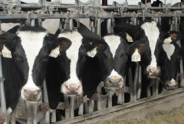Do's and Don'ts When Facing Financial Difficulty
David Balbian, Area Dairy Specialist
Central New York Dairy and Field Crops
August 1, 2016
Do'S
- Complete a production and financial management analysis of your business for 2015. Determine strengths, but most importantly, areas for improvement with immediate response and improvement in cash flow.
- Complete a profitability and cash flow projection/partial budget of the expected impacts of any changes made to improve the business.
- Meet with your lender and share your financial management analysis and cash flow projections. Communicate with your lender often and provide periodic updates regarding your financial situation.
- Cash flow management is the key to surviving difficult economic times. Continually review and update cash projections and partial budgets.
- Meet with suppliers to develop payment arrangements.
- Effectively utilize farm produced feeds, especially forages.
- Feed balanced rations, especially to early lactation cows.
- Treat disease outbreaks, such as mastitis, before they become worse.
- Be an astute purchaser of inputs.
- Examine family living to see if expenses can be reduced.
- Maintain a low inventory; cull unprofitable cows, buy feed as needed.
- Sell nonessential capital items, including machinery and equipment that is not needed to operate the business. Also consider selling land not essential to the business, including possible timber sales. Remember to consult your tax preparer concerning tax liabilities of a sale.
- Examine debt for possible benefits of restructuring, or alternative financing.
- Perform tasks in a timely fashion, yet get enough rest. Sleep deprivation can interfere with performing task and judgment.
- Consider off-farm work by all family members.
- Communicate current financial situation often with management team/family members. Seek and welcome their suggestions and involve them in key financial decisions.
- Adopt new technologies only after careful study.
- Monitor the financial health of those who purchase your farm products. They are also under severe financial pressure in this economic period.
- Seek management advice and analysis assistance early from Cooperative Extension, consultants, FarmNet, and others.
- Seek personal counseling and advice from close friends, clergy, FarmNet and others.
DON'TS
- Make decisions that will make the problem worse in a week, month, or six months down the road.
- Continue the same practices because "I've always done it that way."
- Neglect needed accounting tasks because there isn't time right now.
- Use farm produced feeds so rapidly that they are used up without a replacement plan.
- Reduce purchased feed just to save money.
- Purchase products that promise to be a cure-all, unless you have hard data and experiences of others to confirm.
- Make capital investments to reduce tax liability or because "it's a good buy."
- Borrow money unless the profitability of the farm is reasonably expected to increase in order to provide for repayment.
- Neglect the details; cleaning and maintaining equipment, communicating with and managing labor, detecting heats, etc.
- Use alcohol to excess. Alcohol and other drugs can make a tough situation seem worse.
Upcoming Events
IPM Strategies to Protect Corn and Soybean Seed in NYS
July 22, 2025
Cobleskill, NY
Free event. DEC Credits available
Clearing Hurdles to Improve Milk Quality Conference
July 22 - July 24, 2025
Rochester, NY
three day conference with short courses, seminars, and farm tours
Announcements
Sign Up for Our Weekly E-Newsletter
We send out a bi-weekly e-newsletter that has announcements, upcoming programs, and opportunities for you! Registration is quick, easy, and free. Click here to sign up today!Document and Share Storm Damage
Mother nature has really been difficult over the last few days. Significant damage has been seen throughout NYS. Please let us know what types of damage your farm may have sustained during this time. This could be in the form of property damage, lost power, milk dump due to lost power, loss of livestock, loss of stored feed or growing crops.Farms are encouraged to DOCUMENT AND SHARE any impacts the weather may have had on their home or business. This could include structure damage, crop loss, inventory loss due to power outages, damage to equipment or fencing, and more.
If your farm experienced any sort of damage, please reach out to any of the folks listed below (or all of them). The more impact information that is collected, the greater the likelihood of a disaster declaration which can bring vital emergency support and awareness. The CNYDLFC Team will continue to collect detail and submit to NYSDAM and the EDEN network.
Reporting Weather Related Impacts (For your home or farm business)
- First, ensure that all the people and animals on your farm are safe, and that there aren't any unsafe working conditions created because of the weather (check your structures!). If there's an emergency, call 911 - don't try to manage it all on your own.
- Second, document all negative weather impacts for your farm and their estimated financial cost. Take photos, make estimates, and put it all in a safe place.
- Reach out to your insurance providers - farm, vehicle, crop, etc. to initiate the claim process as needed.
- Then, share your farm's damage with any (or all) of the ag support agencies listed below. We all work together to collect storm damage information and funnel it up to Ag and Markets which can initiate a natural disaster declaration.
Your local Cornell Cooperative Extension Association Office.
- Chenango: 607-334-5841
- Fulton/Montgomery: 518-853-2135
- Herkimer: 315-866-7920
- Madison: 315-684-3001
- Otsego: 607-547-2536
- Schoharie: 518-234-4303
- Saratoga: 518-885-8995
Any of our CNYDLFC Team members (calls/emails/texts/site visit requests all ok)
Your county USDA/FSA service center.
Your county farm bureau manager
Please let us know how we can help you.
- Erik Smith: 315-219-7786
- Daniela Gonzalez: 315-749-3486
- Ashley McFarland- 315-604-2156
Your county USDA/FSA service center.
- Chenango: 607-334-3231
- Fulton/Montgomery: 518-853-4015
- Herkimer: 315-866-2520
- Madison:315-824-9076
- Otsego: 607-547-8131
- Schoharie: 518-295-8600
- Saratoga: 518-692-9940
Your county farm bureau manager
- Region 3: Bailey Coon: 518-937-0566
- Region 5: John Wagner: 315-761-9770
- Region 6: Natally Batiston: 518-937-0269
- Region 7: Todd Heyn: 518-431-9338
Please let us know how we can help you.
Cash Rent and Custom Harvest Survey
To date, there is limited information available about rental rates and fees for crop harvesting. Farms can use this valuable information for their farm business planning to help improve decision making and profitability.The data that is collected, and the subsequent reports/findings/resources will be helpful for all of us to answer that call of "What's the average rental rate in my area?" and "How much do people charge to combine oats?"
Farmers Can Join MeatSuite For Free!
MeatSuite.com is a free resource provided by Cornell University where NY meat farmers can create a farm profile and list their bulk (wholes, halves, quarters) and bundled (i.e. Grilling Bundle) meat products.Why should farmers join?
1. It's free and easy!
2. Connect with more local customers. In the past year the MeatSuite.com farm directory had 8,300 visits from New York consumers. Farm profiles get as many as 25 views per month from potential local customers. We also spotlight MeatSuite farms on social media and bring attention and purchases to farms through highlights and giveaways.
How do I join?
Farmers can visit https://www.meatsuite.com/farmers/ to create a free farm profile. You must list at least one product for your farm's profile to go live. You'll also have access to Cornell's free Meat Price Calculator, a helpful tool for pricing your meat to make a profit.
While you're on MeatSuite, check out the "Creating Consumer-Friendly Bulk Meats" publication on the log-in page. It has tips on how to create bulk meat products that are easier for first-time buyers to say "yes" to.
If you have any questions as you create your farm profile or products, we're here to help! Please email Matt LeRoux at mnl28@cornell.edu.




